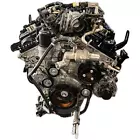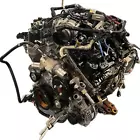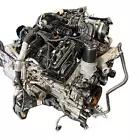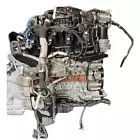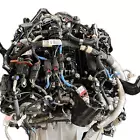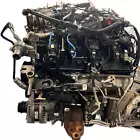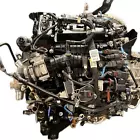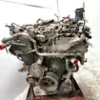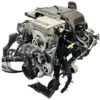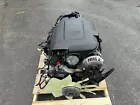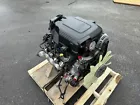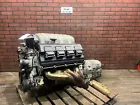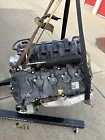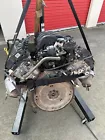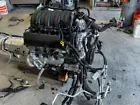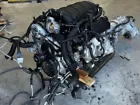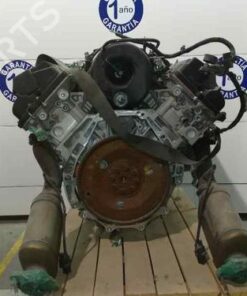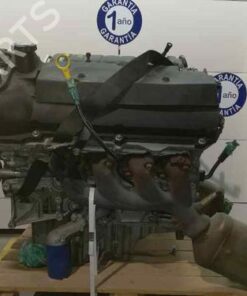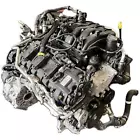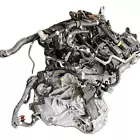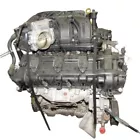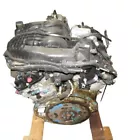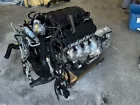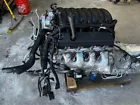Engine Options & Pricing Overview
A. Used / Salvage Engines
offers numerous FORD F150 2.7L V6 Engine (used/remanufactured), with prices roughly ranging from US$1,400 to $4,600, depending on years/mileage:
-
-
2018–19 fitment: around $1,400–$1,900
-
2019 F‑150 engines: between $1,580–$3,800
-
2021–23 engines: around $3,000 for 28K miles
-
2021–23 engines with 71K miles: approximately $4,240
-
2017 model: around $3,200–$4,800
-
Global listings, e.g., Europe: around €3,900 (~US$4,080)
-
B. Complete Engine Units
-
Listings with more inclusive packages:
-
2.7 L Turbo with turbos included, 54K miles (2018): $2,937
-
Complete assembly (72K miles, 2015–16): $4,399
-
C. New / Crate & Remanufactured Engines
Fraser Engines (Remanufactured, “crate” style)
-
Sale Price: $6,811
-
Core Deposit: $1,000 (refundable)
-
Shipping: ≈$300
-
Warranty: 3 years/unlimited miles, with optional extended warranties
-
Built to OEM specs, zero‑mile quality
Doranautoparts (Used Complete Engine)
-
Price: €1,700 (~US$1,800–$1,900)
-
12‑month warranty, includes essential components; mileage ~8,000 km
Reliability & Engine Traits (Owner Feedback)
A. Reliability Highlights (from owners)
-
Many owners praise the 2.7 L EcoBoost’s reliability:
B. Common Issues to Note
-
Some recurring maintenance concerns:
-
Oil pan leaks, spark plug/ignition coil issues, carbon buildup
-
Instances of intake valve failure (e.g., in Canada): Ford eventually issued a recall and replaced affected engines
-
C. Technical Strengths
-
The second-gen 2.7 L EcoBoost (2018‑up) includes:
-
CGI block high strength, port + direct injection, lower friction, improved EGR, stronger cam drive, better wastegate control
-
Choosing Between Options: Pros & Considerations
| Source Type | Price Range | Pros | Potential Drawbacks |
|---|---|---|---|
| Used / Salvage (eBay, etc.) | $1,400–$4,600 | Cheapest up‑front | Unknown history; wear; often sold “as-is” |
| Used Complete Engines | $2,900–$4,400 | More turnkey; often includes accessories | Still used; warranty coverage if any may vary |
| Doranautoparts (Used w/ Warranty) | ~US$1,800 | Lower cost with 12‑month warranty | May be far from OEM reman quality |
| Fraser Remanufactured (Crate) | ~US$6,811 + fees | OEM rebuild quality; strong warranty | Higher upfront cost + core/shipping costs |
Real-World Buyer Insights
-
On remanufactured engines:
-
On buying used:
-
On overall recommendation:
-
On long-term durability:
Recommendations by Scenario
-
Tight Budget & DIY Savvy
Choose a used engine (~US$1,400–$2,000) if you can inspect, verify service or VIN history, and trust your skill. Be ready for possible extra parts or repairs. -
Balanced Value & Reliability
A used complete engine (~US$2,900–$4,400) offers more peace of mind—often includes turbos, mounts, and tested condition. -
Low Risk & Long-Term Durability
Ferrer’s Fraser remanufactured crate engine (~US$6,800 plus fees) offers near‑new quality, strong warranty, and likely fewer surprises. -
Europe-Based / Budget Option
Doranautoparts’ used complete engine (~€1,700) may be viable—especially with their warranty—but confirm quality and sourcing.
Buying Tips & Final Thoughts (for ~2.7 L EcoBoost)
-
Know Your Fitment: Verify the correct answer based on your VIN (especially check the 8th digit). Revisions happened over years.
-
Ask About Mileage & Warranty: Lower mileage listings tend to be pricier. Look for warranty or return terms—top-tier sellers often offer 90-day or longer protections.
-
Investigate Usability: If used, request a compression test, video of it running, or photos of condition. Daronautoparts offers a tested engine with 12-month warranty.
-
Factor In Hidden Costs: Core charges, shipping, import tariffs, and labor for installation can materially affect total cost.
-
Consider Reliability & Maintenance: Stick with regular oil changes, monitor for leaks or misfires. Many owners run these beyond 150k miles trouble‑free.
-
Opt for Upgraded Build if Available: The second-gen engine features improvements in materials and fuel systems. Aim for 2018+ if possible.
-
Be Aware of Epic Fail Risks: Some rare units had intake valve issues or early failures. Ford addressed many via recalls.
Summary: What Should You Choose FORD F150 2.7L V6 Engine?
-
Best long-term reliability: Fraser reman crate engine (~US$6.8k)
-
Best value with good coverage: Used complete engine (~US$3–4k)
-
Lowest cost (DIY risk): Used core (~US$1.4–2k)
-
Europe-specific budget option: Doranautoparts (~€1.7k)
Final Word
The FORD F150 2.7L V6 Engine is generally considered a robust and efficient engine—compact yet powerful, with many long‑haul users reporting excellent longevity. Your choice will balance budget, risk tolerance, and long-term expectations. If you want help narrowing to specific listings or factoring in your location (like availability/shipping to Cameroon), feel free to ask—and I can help locate actual listings or suppliers.


